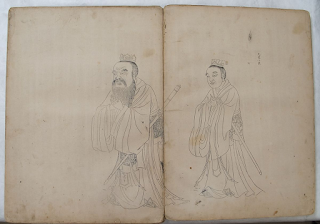Confucianism and Daoism in Ancient China
Introduction
In this post, I will be looking at two chapters from Awakening: An Introduction to the History of Eastern Thought that focus on both the history and practices of Buddhism. This textbook, written by Patrick S. Bresnan, is meant to engage students with the deeply rich history, practices, religions, and cultures of multiple countries in the East. The text mainly focuses on India, China, and Japan, while simultaneously attempting to examine the relationship between Eastern and Western traditions.
Chapters 13 and 14 of the textbook cover the systems of Confucianism and Daoism within Ancient China, with chapter 13 focusing on Confucianism and chapter 14 focusing on Daoism. “But to fully understand the teaching of Confucius we must see it in its larger context...in the broad historical context out of which the Age of Confucius evolved”(Bresnan 301). This post will discuss two questions from the textbook, one from the end of each chapter, in order to achieve a better understanding of the various aspects of both Confucianism and Daoism, as well as their importance in shaping Ancient Chinese civilization.
Confucianism
Question #1: The chapter begins with the statement that “Confucius gave to Chinese civilization a grand ideal for the ordering of society.” In general terms, what was this grand ideal? Do you agree that it was all that “grand”?
 |
| Life of Confucius Artist Unknown Late Qing dynasty (1644–1911) Metropolitan Museum |
ny between human nature and natural order.
In general, I would say that I agree that Confucius’s ideals were grand. So grand that I would argue that imperfections were bound to occur within the Confucian system. What Confucius had outlined was a system that would counteract the negative aspects of human nature through natural order, making for a society of individuals who all demonstrate refinement and compassion. In Confucius’s system, every piece works perfectly together. His ideals were extremely ambitious and would inspire Chinese social thinking for many years. For these reasons, I would argue that Confucius’s ideals were grand.
Daoism
Question #2:Why do you think the Daoists were so passionately opposed to the Confucian system? What especially did they dislike about it?
 |
| Daoist Immortal Artist Unknown Five Dynasties period (907–60) Metropolitan Museum |
Daoists especially took issue with the Confucian system, feeling that it not only failed to restore man to his natural state, but in many ways made things much worse. “The simple, natural life that the Daoists cherished was seen to be smothered in the complex, highly formalized was of the Confucian system”(Bresnan 339). The structure of the Confucian system did not at all appeal to the beliefs of the Daoists and for this reason they could not bring themselves to agree with the Confucian system.
Bresnan, Patrick S. AWAKENING : An Introduction to the History of Eastern Thought.
S.L., Routledge, 2021.
Khan Academy. “Confucius and Confucianism.” YouTube, 27 Feb. 2017,
www.youtube.com/watch?v=iPQ6GB822x4.
Metmuseum.org, 2021, www.metmuseum.org/art/collection/search/53201.


Comments
Post a Comment